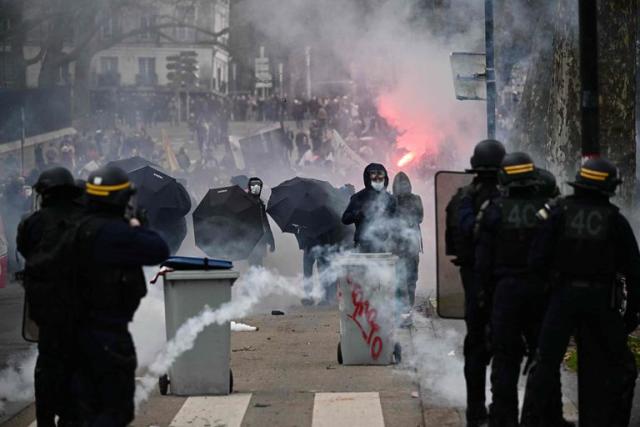France faces second wave of strikes in protest against pension reform
France is bracing for another day of mass protests and strikes on Tuesday over proposed pension reforms championed by President Emmanuel Macron. The government and the political opposition continue to trade blame for the expected disruption in schools, the fuel distribution sector and public transport.
An estimated 1.1 million people took to the streets for the first strike day on 19 January, according to official statistics. That was the biggest demonstration since the last major round of pension reform under right-wing president Nicolas Sarkozy in 2010.
The security forces are expecting similarly sized crowds on Tuesday in 240 demonstrations around the country, in addition to mass strike disruption to transport, education and other services.
The government and the political opposition are desperately seeking to sway public opinion ahead of what is expected to be a bitter and costly standoff if more strikes are called over the next month.
Hard-left MP Mathilde Panot from the France Unbowed (LFI) party accused President Macron and his ministers of being responsible for the stoppages that are expected to cripple public transport and other services.
“They’re the ones who want to wreak havoc,” she says.
Work until you reach 64!
The most controversial part of the proposed reform involves increasing the minimum retirement age to 64 from its current level of 62, which is the lowest level in any major European economy.
Macron made the change part of this re-election manifesto in April last year and he insists the reform is essential to guarantee the future financing of the pension system, which is forecast to tip into deficit in the next few years.
Opponents point out that the system is currently balanced and that the head of the independent Pensions Advisory Council recently told parliament that “pension spending is not out of control, it is relatively contained.”
Age limit not negotiable
The government headed by Prime Minister Elisabeth Borne has signalled there is margin for discussion on some measures as parliamentary committees started examining the draft law on Monday.
Conditions could be improved for people who started working very young, as well as for mothers who interrupted their careers to look after their children and for people who invested in further education, Borne has suggested.
But the headline age limit of 64 is not up for discussion, she said Sunday, calling it “non-negotiable.”
Laurent Berger, head of the CFDT union, warned that the Borne “cannot remain deaf to this formidable mobilisation.”
Impact on travel, schools
Most Paris metro and suburban rail services will be severely restricted on Tuesday, said operator RATP, while intercity travel will be badly disrupted with just one high speed train in three, according to SNCF.
Only minor disruption is expected on international Thalys and Eurostar train services.
Air travel is less badly affected with Air France saying it would cancel one in 10 short and medium haul services while long-haul flights will be unaffected.
According to the Snuipp-FSU, the leading primary union, half of first-degree teachers would be on strike on Tuesday.
In a press release, the union indicates that “in a context where working conditions are deteriorating and where the hope of being better paid is dwindling over the course of consultations with the ministry, teachers are refusing to work up to 64 years old”.
Macron and his allies are also facing struggles in parliament as well as on the street.
The left-wing opposition has submitted more than 7,000 amendments to the draft legislation in a bid to slow its path through parliament during debates on Tuesday and Wednesday.
Macron’s centrist allies, short of an absolute majority in parliament, will need votes from conservatives to get their pensions plan approved.
A new poll by the OpinionWay survey group, published on Monday in Les Echos newspaper, showed that 61 percent of French people supported the protest movement, a rise of 3 percentage points from 12 January.
Interior Minister Gérald Darmanin said 11,000 police, 4,000 in Paris alone, would be deployed on Tuesday across France to ensure the demonstrations will pass off peacefully.
Read more @rfi
261 views










